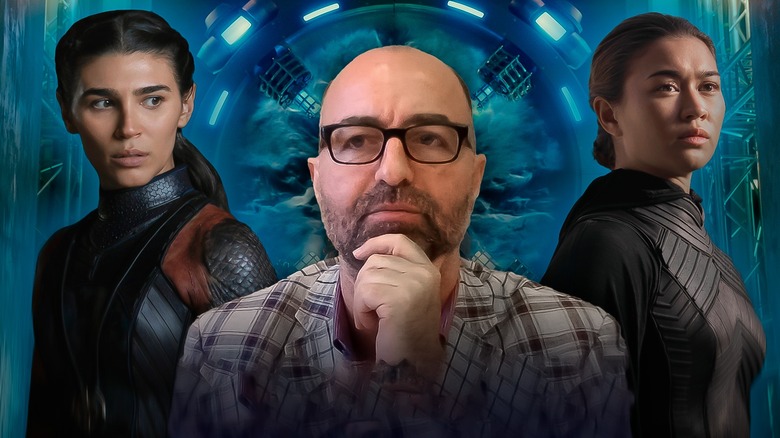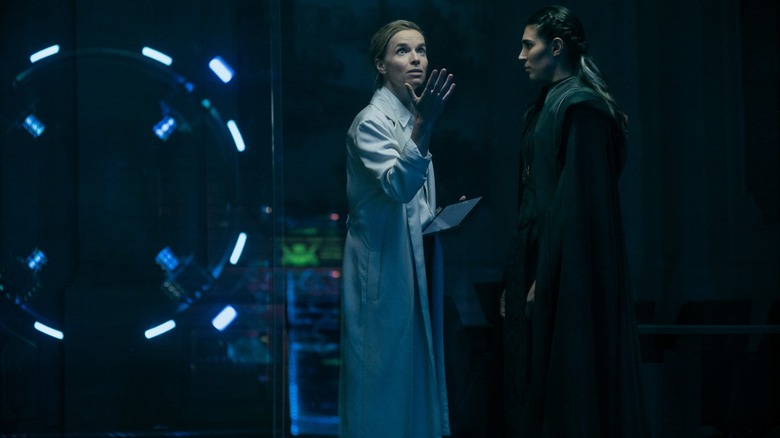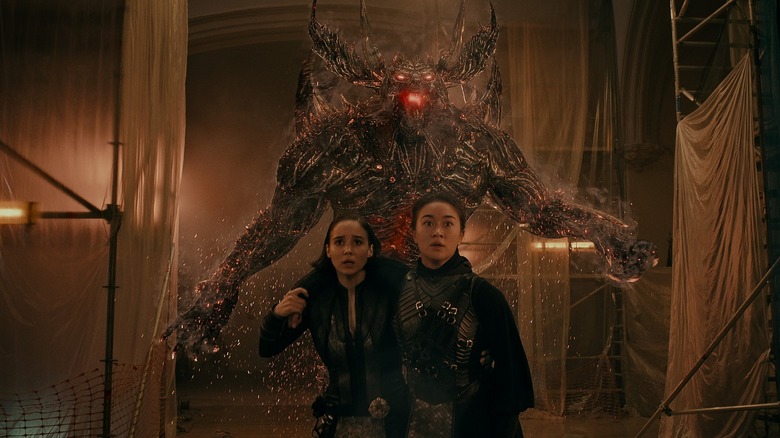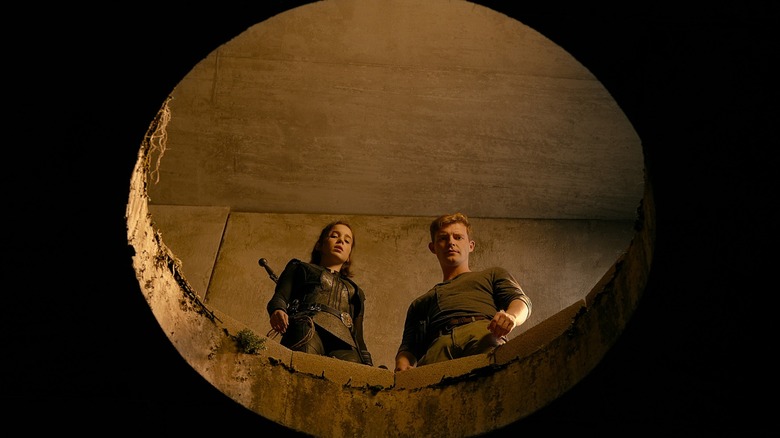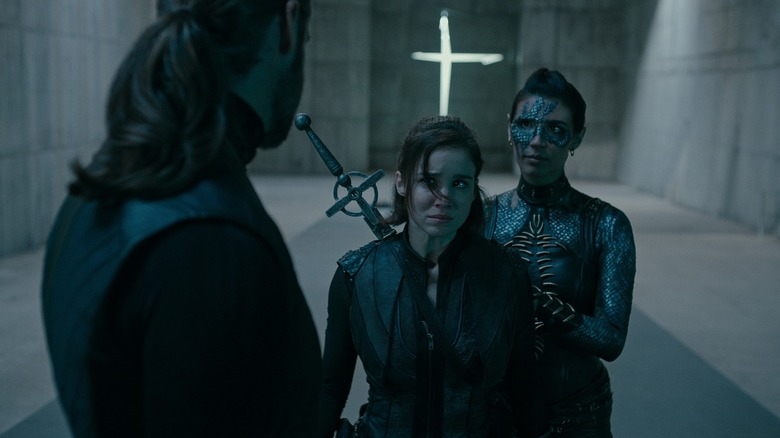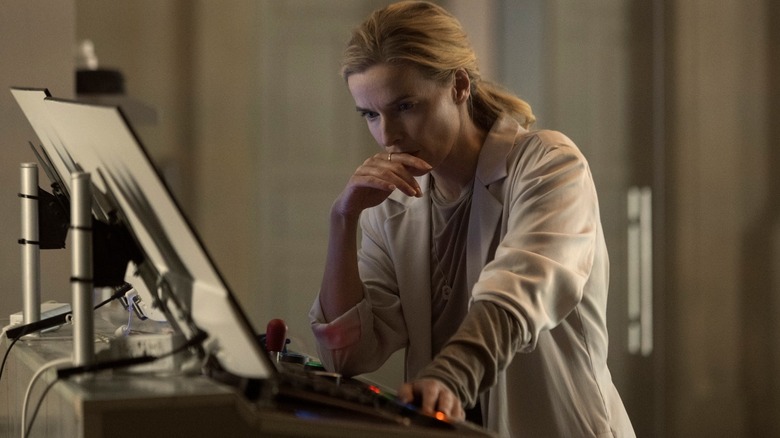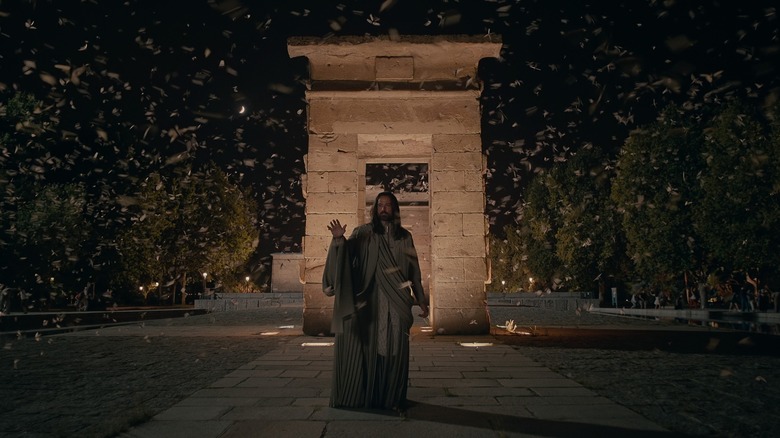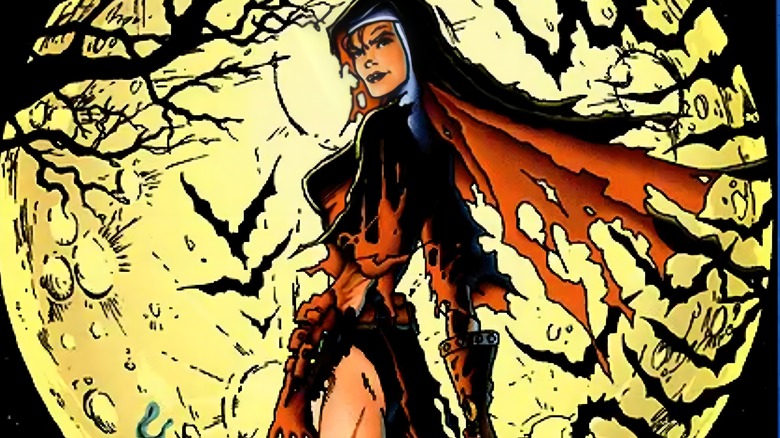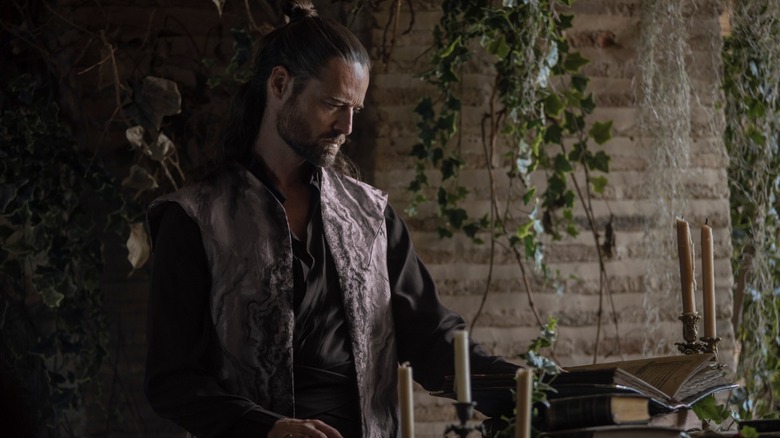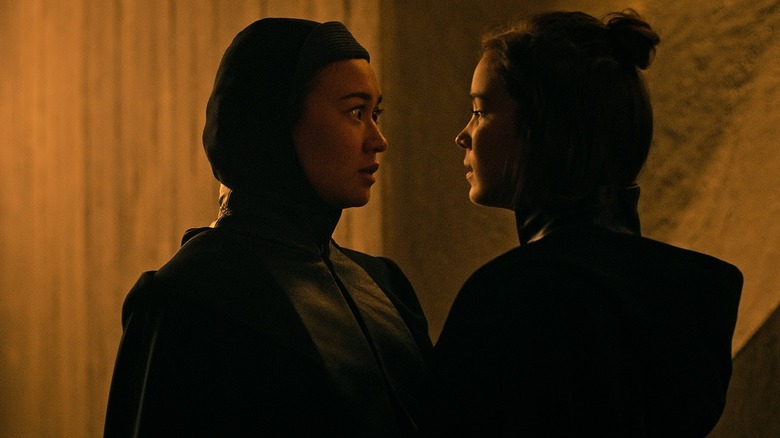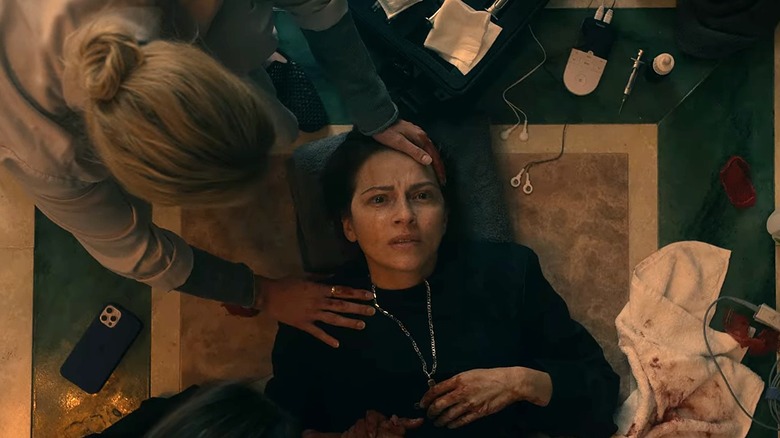The Warrior Nun Movies Will Fail Without The Creator, But That's A Good Thing
You know those "What I Ordered vs. What I Got" memes, right? Where you purchase a silk replica of Keira Knightley's emerald green gown from "Atonement" and receive in the mail a piece of shiny green Halloween costume fabric? That's what happened to millions of fans who believed "Warrior Nun" would be given the resurrection it deserved, only to discover they'd been sold a bill of goods.
In June of this year, showrunner Simon Barry revealed on X, formerly Twitter, that the global movement to #SaveWarriorNun had, in fact, saved "Warrior Nun." After thanking fans for their passionate efforts, he announced a return "more EPIC than [they] could imagine. More details to come!" When those details finally came — to both fans' and, apparently, Barry's own surprise — they were riddled with red flags.
First, on August 15th, "Warrior Nun" executive producer Dean English announced on YouTube that the return would come in the form of "a trilogy of feature films" (so, not a series renewal) that could potentially evolve into a whole universe. Then, Barry — along with producers-writers Amy Berg and David Hayter — informed fans that they'd been left out of this proposed Marvel-ization of "Warrior Nun."
If, as a "Warrior Nun" fan, you're currently feeling a combination of disappointment, frustration, and anger, fear not. In this case, the exclusion of Simon and co. could prove to be a very good thing. Not because the films will actually benefit from the absence of these creatives, but because the story itself — and that story's legacy, meaning, and impact — won't benefit from the factory-made, pre-packaged big budget franchise format.
It could, however, benefit from the failure of this big screen bait-and-switch.
Hear us out on why the Warrior Nun trilogy flopping is good for Warrior Nun
Ultimately, the fight for "Warrior Nun" is about more than a single television series. In so many ways, its success and premature cancelation, the party line Netflix clung to in the latter's aftermath, and the campaign to bring it back are all elements of an even greater conflict — a single battle in the ongoing war for the very soul of storytelling.
It may be an unfair burden to bear, but what happens next will determine what kind of lesson Netflix, and studios, and streamers in general, all take away from this "Warrior Nun" journey. And for better or worse, that lesson will have an impact on which stories get to see the light of day, the form those stories take, and the quality and level of depth they possess. In more concrete terms: if these films are even remotely successful, they'll reinforce the lesson every algorithm-driven company has been running on for the last handful of years: that as long as you slap the right title on a project, and churn out as much content as possible under that title's umbrella, viewers will continue to show up.
Netflix, in particular, will learn that it can continue cancel high-quality series that don't immediately play to the largest audience possible, then wait for someone else to take the risk of bringing it back in some form, before finally hopping back on the bandwagon by bringing the story back in a freshly diluted form. And make no mistake — this upcoming iteration of "Warrior Nun" will be, at best, a mere shadow of the original ... unless, that is, the trilogy fails significantly enough to usher in a turning point.
A bigger budgeted Warror Nun won't be a better Warrior Nun
At first blush, the idea of transforming a beloved series into three feature films and an expanded universe would seem like a major win for fans — an unexpected upgrade that would not only meet, but surpass demands for a third season from Netflix. Big movies, after all, mean big budgets, and if "Warrior Nun" succeeded in looking so good and reaching so many when it wasn't that costly, well ... imagine what it could do with a major studio-sized bank account, right?
Unfortunately, the problem with a big purse isn't the contents; it's the strings.
We can safely assume this will be a big budget project, since studios don't make "mid-budget" movies in 2023, much less "mid-budget" universes. But studios don't throw money at an IP out of the goodness of their hearts, and when you're spending money to make money, you also spend a whole lot of time and energy on risk mitigation. The question, for those holding the purse, is not about story quality, but about how to reach the broadest possible audience and make the most money. This has always been the case in Hollywood, but today, rapidly advancing tools of the trade have made this low-risk, high-reward approach to art and innovation — two things that, by definition, require risk — an almost infallible science.
Does anyone really want "Warrior Nun," of all series, to be a part of this?
The Warrior Nun trilogy will be painfully safe and sanitized
If this is all starting to sound familiar, it's because this same use of the Almighty Algorithm is what prompted Netflix to unjustly cancel "Warrior Nun" prior to Season 3 in the first place. And with a feature film trilogy and potential "universe" on the line — that is, with the stakes and dollar signs multiplied ten-fold — you can bet that those elements of "Warrior Nun" that made it so unique and valuable in the first place will be some of the very first things to go.
In fact, let's play a game called "Which One of These Things will be Surgically Removed First."
Will it be (A) the series' willingness to question powerful religious establishments, and distinguish between faith and religion? Or maybe (B) the writers' trust that viewers will not confuse that questioning with maligning? Maybe it'll be (C), the fully-formed queer characters? Let's not forget (D), the series' refusal to draw clear-cut lines around "good" and "evil," or reduce its central conflict to a Big Bad vs a Team of Goods.
The reality is that all of these elements are in danger of getting plucked from the story, because none of these elements have predictable results with regard to a mass audience. As producer Jason Blum (of Blumhouse, a frequent champion of lower budget projects) explained on "Geek's Guide to the Galaxy," back in 2015, "It's hard to make a movie that's very expensive and not be thinking of the results all the time" (per Wired).
The additional problems with mapping out a Warrior Nun trilogy
This pressure to tell a more easily marketable, easily digestible, sure-thing narrative — and the seemingly infallible data and feedback loop informing the construction of that narrative — would be in place whether or not Barry was attached to the project. And while it's entirely possible that the series' original creatives would be in a unique position to deliver the best story possible regardless of that pressure, they'd still have to grapple with the fact that a universe-spawning, pre-packaged film trilogy, however well-informed, is not the correct form for this particular story's function.
For starters, the majority of iconic and artistically impactful film trilogies out there, "Lord of the Rings" aside, weren't conceived as trilogies at the outset. "The Godfather" trilogy, "The Dark Knight" trilogy, and yes, even the original "Star Wars" trilogy (as George Lucas' 1978 interview in TIME proves) weren't written as "epic trilogies," and it shows. These films are examples of great storytelling because their creators told a whole, significant, fulfilling narrative in one film, then created a sequel that made sense for that story, but that also stood on its own. As Nolan told Deadline of his acclaimed take on Batman, "We never had a specific trajectory. I wanted to put everything into making one great film."
If we compare that approach to something like David Gordon Green's recent trilogy of "Halloween" films (co-produced by Blum, who maybe should have listened to his 2015 self), the problem with this particular plan of attack becomes very clear.
The Warrior Nun trilogy will mirror the problems of the Halloween trilogy
"Halloween" (2018) is a decent film. "Halloween Kills" and "Halloween Ends," however — which were green-lit together, and written alongside one another — are messy piles of story scaffolding, lazy fan service, and mixed and even contradictory metaphors. Neither of them succeed, from a storytelling perspective, as standalone films, and neither of them add anything at all to his 2018 reboot. If anything, their existence tarnishes everything Green's first installment managed to achieve. "Halloween Kills," in particular, is nearly two hours of pure filler, a story that exists solely to get us from Movie 1 to Movie 3. Not only that, but we know Movie 3 is coming, and as a result, nothing we're seeing matters.
That's what happens when a story is forcibly stretched out across just two out of a trilogy's three films. But when a creator is tasked with stretching a story across three films (and a potential universe), before the first is ever made, you end up with something even less redeemable, particularly when that creator is faced with all the obstacles that come with adapting an IP with a built-in fan-base.
Trilogies like this fail because films that exist solely to explain or expand the films on either side of them (so $500 million can be made instead of $200 million) aren't so much films as they are very expensive trailers. What's more, if the story you're telling takes roughly three films and six-plus hours to tell right off the bat, then the story you're telling probably isn't a movie — it's a series.
Warrior Nun is meant to be a series
As screenwriter Erik Bork ("Band of Brothers") once wrote, "Features are about one big problem that gets resolved. Series are about one big unsolvable problematic situation in which there can be many smaller problems along the way that resolve somewhat."
Call us crazy, but if, in over 200,000 years of existential contemplation, humanity has yet to "resolve" the fundamental questions at the heart of "Warrior Nun" — questions we wouldn't have answers to even if we knew everything there was to know about the story's take on creation — it really seems like a one hell of a stretch to suggest that a trilogy of features is gonna crack that nut. Obviously, that can't, and won't, be its focus or goal (since "existence" is very much not a resolvable problem), so the idea that this trilogy will be any logical continuation of the Netflix series simply doesn't make sense.
Then again, a trio of "Warrior Nun" films — at so early a juncture, at least, when so much of the narrative's overarching conflict has yet to fully reveal itself — doesn't make sense, either. "Warrior Nun" is, and was always meant to be, a series.
From a storytelling standpoint, all these three films have to offer is what "Warrior Nun" would have been if Dean English and Robert Burke (of Ten One Entertainment) had moved forward with their original plan back in 2015. At this early stage, there's nothing to suggest (one way or the other) that English is hoping to reboot — or, restore — the series to his original vision for it, but that original vision really warrants our attention here.
Dean English's original vision of Warrior Nun isn't the show we got - and his trilogy won't be, either
In 2015, Dean English optioned adaptation rights from Ben Dunn, creator of the "Warrior Nun Areala" comic series. English then created a Warrior Nun Kickstarter for the project, complete with some dominatrix-lite participation from the comic series' characters. It's a far cry from the series we know today.
However you feel about '90s Bad Girl comics (there's a lot to unpack there, so let's save that for another day), it's important to note that Dunn's series ran on an intentional camp that made his scantily clad nuns a (near) full-on parody of the genre. And while Barry's series is undeniably funny, absurd, and self-reflexive at times, the TV series adaptation that fans fell in love with is still very much a drama with elements of dark comedy — not a parody that revels in camp. If anything, the hyper-sexualization of Dunn's "strong female leads" was so intentionally over-the-top, and so openly comedic, that it could make for a seriously fun commentary on gender, sexuality, and the treatment and depiction thereof in popular media. But parody doesn't make you a universe, and it's not what English and Burke had in mind, either...
The original Warrior Nun adaptation was rescued by Simon Barry: This one won't be
In that original pitch, Robert Burke spoke about spin-offs and cinematic universe potential. Dean English was hyped about how time travel could allow for multiversal crossovers. Who saved us all from this debacle?
Yeah. You guessed it. As Texas Monthly's Dan Solomon reported, after English's original "Warrior Nun" movie project failed to gain traction, he got some tips from his friend Simon Barry. Barry knew exactly what the issue was: with all that story to pack in, it really needed to be a TV series.
To be clear, English isn't the bad guy in this saga, and without his feature ambitions, Netflix's "Warrior Nun" wouldn't exist. But the fact remains that "Warrior Nun" is, was always meant to be, and will continue to work best as, a series. It should have been renewed in series form (and still needs to be, if you're paying attention, Amazon) and this is the message fans — and anyone else who cares about how and why stories get made — should be hoping that Hollywood receives.
If your first impulse in the face of this misguided revival is to hope that the upcoming films — regardless of how bad they are, and regardless of how ill-suited their form is to tell such a story — will simply lead to a "real" series renewal, you might want to consider what a financially successful but artistically bankrupt franchise reboot will implicitly sanction and create. Unfortunately, it's not just trite, overblown storytelling that fans have to fear from this suspect reboot.
The success of the Warrior Nun trilogy would be damaging for future artistic risks, not just Warrior Nun
The wrong form and the wrong motivations can do serious damage to any story, but in the case of "Warrior Nun" — particularly with regard to what the series is and has meant vs. what it could turn into and ultimately mean — the stakes are even higher.
"Warrior Nun" spoke to a wide range of viewers for various reasons, but the beating heart of its power is simple: against all odds, it never fell prey to what Martin Scorsese once controversially pinpointed as the problem with much popular media today: "The gradual but steady elimination of risk." From a strictly structural standpoint, "Warrior Nun" is pretty standard Hero's Journey fare, it remains a revelation for the same reasons the right kind of revival is so crucial to its lasting success and impact.
Some of what makes "Warrior Nun" relevant and valuable is obvious: its ability, for instance, to portray queer characters as — wonder of all wonders — whole, human, people. However, other aspects of its singularity may be less tangible, but they're every bit as integral to the story's power and potential.
Warrior Nun fans, rally for this next battle
Unlike many a superhero film franchise, "Warrior Nun" is defined as much by the quiet, the subtle, the implicit, and the unanswered as it is by the loud, the surreal, the explicit, and the concrete. It was never going to instantaneously speak to the widest audience possible. Ultimately, the series' strongest asset is its consistent rejection of the algorithmically approved and commodified.
It was, of course, punished for this defiance — sacrificed, even. And while it may be low-hanging fruit, it's not a stretch to say that "Warrior Nun" died for our sins. For years now, audiences have either passively accepted or enthusiastically lapped-up mediocre content that calls itself storytelling, solely because it's what's being offered. If Netflix and other streamers and studios run on "Because you watched X, you'll watch a cheaper, less innovative X" it's because we have allowed it to do this to us.
This trilogy being made without Simon Barry is not a revival of the series that was lost, and if it's all successful, fans will have won a temporary battle, only to lose a more significant war. Barry's series has all the hallmarks of a narrative that, like "Star Trek" before it, could have evolved over time in the right form, and under the right leadership, into a sprawling world whose stories span and speak to multiple generations. But it won't happen like this. It won't happen, in this life or the next, unless viewers send a message by resisting temptation, and refusing, for once, to settle for the franchise content consolation prize.
